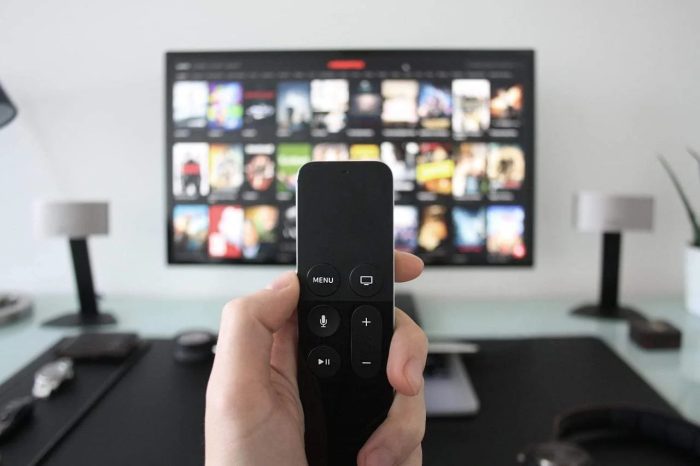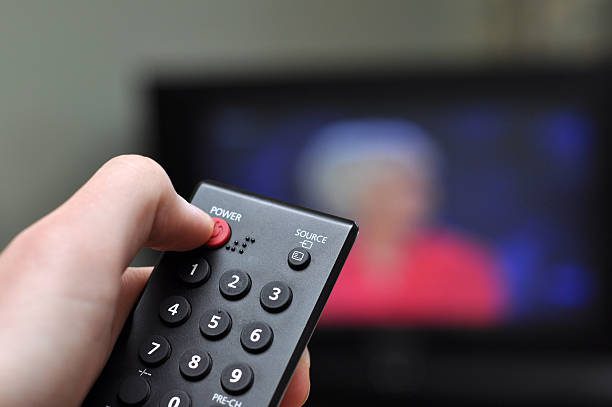Almost every household has a TV, as many people enjoy relaxing after a busy day by watching movies, shows, news, documentaries, and more on such electronic devices.
That said, many people are unaware that radiation is not caused only by nuclear power plants but also exists in our houses to some extent.
TVs, like other electronic devices, use electricity to create moving pictures with sound, which involves producing electric and magnetic fields or electromagnetic radiation. But do TVs emit radiation when turned off? Read this post to find out more.

Do TVs Emit Radiation When Turned Off?
Even when turned off, TVs emit a measurable amount of EMF radiation. That said, the amount depends on the type of TV that you have.
An important thing to know is that the device is not entirely shut down when the screen is not on. Hence, the TV radiates a small amount of EMF radiation even when it is not powered.
TVs and EMF Radiation
Do TVs emit radiation when turned off? This is a question that concerns many TV users. Due to people’s time in front of the TV, EMF emission is continuously raising health concerns. So, let’s get into the details.
In the same way as other electronic devices at home, TVs produce non-ionizing radiation. Although such radiation is not harmful in the short term, it can lead to many health issues if exposed in the long term.
How do the TVs emit radiation?
In the same way as other electronic devices, the TVs have a circuit board that emits a small amount of radiation.
Some modern electronic devices also require different electricity than the one provided by the wires, causing surges of electricity that emit radiation.
Older electrical devices such as TVs contain components known as capacitors. They hold electricity for a certain amount of time and are used to stabilize power when the electricity from the power outlet is not consistent.
Given this point, the TVs continuously draw electricity even when not powered on. This is called a trickle charge, providing a small amount of EMF radiation.
How much radiation does TV produce?
The amount of EMF radiation the TV produces varies from one TV to another as they come in different sizes and quality, use different technology, etc.
Studies have shown that an average TV produces 25 to 500 mG (milligauss) at a distance of one inch and 4 to 20 mG at a distance of one foot.
As we can see, the exposure is stronger the closer you are to the device and weakens the more you move away from it.
According to studies, modern TVs with LCD and Plasma screens don’t produce X-ray radiation but only EMF radiation. Such radiation is only possible in TVs that contain a cathode ray tube and can pose a potential health hazard that must be controlled.
Smart TVs
High-tech modern TVs have a lot of smart functions like automatic programming, recording a show, and updating. Such functions need electricity to work, so your TV will still emit EMFs as long as it is plugged in.
Smart TVs have smart features that require a network connection, and they transfer a lot of data, producing EMF radiation via radio frequency.
The WiFi operations still run when the device is turned off, but the emission of radiation is lower than the one produced when you are watching TV.
How to Prevent EMF Radiation From the TV
If you are concerned about your health due to the emission of radiation in your home, here is what you can do to protect yourself and minimize EMF exposure or prevent EMF waves entirely.
Turn off and unplug the TV
To prevent EMF radiation from your TV, you will need to turn it off and then unplug it. The TV produces EMFs only when it is connected to electricity. It is essential to know if you have a smart TV, as many of its features rely on a Wi-Fi connection.
Smart TVs are not turned off when the screen is not on, but when you unplug them from an electrical outlet.
Doing so will cut the Wi-Fi connection and prevent radiation. Some TVs also enable you only to turn off the Wi-Fi connection.
However, keep in mind that some of the smart functions will not work. Unplugging your TV will also reduce your electricity bill as a bonus. Another option is turning off the network connection from the router or the modem.
That said, even though some smart functions will still work, this will prevent any device from getting a Wi-Fi signal. Owners of smart TVs can also look at ways to connect them to Ethernet to reduce Wi-Fi usage.

Place the TV in another room
As mentioned, the closer you are to the electronic device, the more you are exposed to radiation.
Hence, another option is placing your TV in another room instead of your bedroom to increase the distance between you and your electronic device. This will save you from the need to unplug the TV all the time.
For every foot that you are away from the radiation source, the radiation reduces by 75%.
Create a Faraday cage
A Faraday cage is made from a conductive material and works as an EMF shield. It blocks any signal, including network and electronic signals.
It also prevents EMF radiation which is why it is often used for the protection of electronic devices.
While this may sound like an extreme measure, it is the most effective way to stay protected from the radiation coming from electronic devices. Such cages come in several different forms.
You can build one at home using suitable materials or purchase a professional one for improved protection.
On the market, you can also find soft fabric shields that you can easily throw on the TV to prevent this type of radiation.
Conclusion
Therefore, do TVs emit radiation when turned off? Well, as you saw above, now you know what to do in such a case.
The radiation produced by TVs depends on the type of electronic device you are using and can affect your health in the long run.
For this reason, creating a safe distance and implementing methods for minimizing EMF exposure from electronic devices are often recommended.
